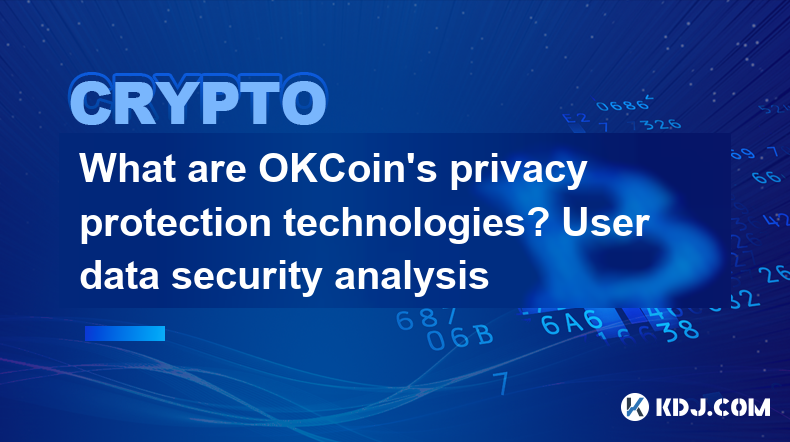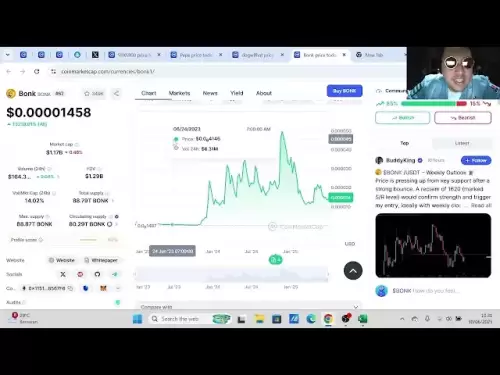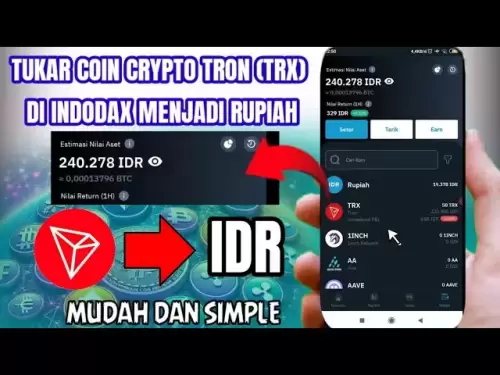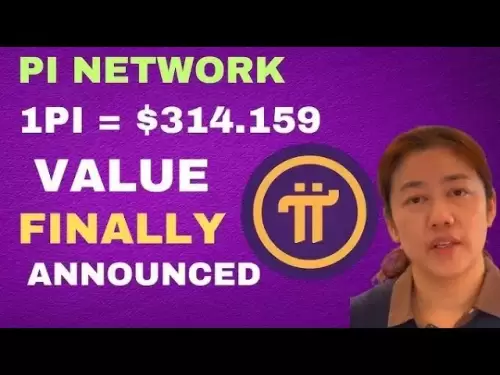-
 Bitcoin
Bitcoin $107,725.9156
0.27% -
 Ethereum
Ethereum $2,481.6786
1.84% -
 Tether USDt
Tether USDt $1.0003
0.01% -
 XRP
XRP $2.2154
1.26% -
 BNB
BNB $658.2447
1.42% -
 Solana
Solana $157.2028
4.24% -
 USDC
USDC $1.0000
0.02% -
 TRON
TRON $0.2788
0.91% -
 Dogecoin
Dogecoin $0.1655
1.00% -
 Cardano
Cardano $0.5714
2.67% -
 Hyperliquid
Hyperliquid $40.6187
6.30% -
 Bitcoin Cash
Bitcoin Cash $519.8117
5.84% -
 Sui
Sui $2.8338
0.59% -
 Chainlink
Chainlink $13.4150
0.60% -
 UNUS SED LEO
UNUS SED LEO $9.1205
-0.54% -
 Avalanche
Avalanche $18.0666
0.85% -
 Stellar
Stellar $0.2363
-0.46% -
 Toncoin
Toncoin $2.9550
2.57% -
 Shiba Inu
Shiba Inu $0.0...01151
-0.15% -
 Litecoin
Litecoin $86.2252
-0.57% -
 Hedera
Hedera $0.1498
1.51% -
 Monero
Monero $318.0620
3.18% -
 Polkadot
Polkadot $3.4174
-0.02% -
 Dai
Dai $1.0000
0.02% -
 Bitget Token
Bitget Token $4.5444
-1.05% -
 Ethena USDe
Ethena USDe $1.0003
0.00% -
 Uniswap
Uniswap $7.1773
-0.53% -
 Pepe
Pepe $0.0...09916
3.19% -
 Aave
Aave $274.7399
0.32% -
 Pi
Pi $0.5136
-2.06%
What are OKCoin's privacy protection technologies? User data security analysis
OKCoin uses encryption, secure storage, and access controls to protect user data, complying with regulations like GDPR and CCPA. While robust, inherent online and crypto risks remain; users should understand these measures to assess their risk tolerance.
Mar 13, 2025 at 07:16 pm

Key Points:
- OKCoin employs a multi-layered security approach encompassing data encryption, secure storage, and robust access controls.
- User data privacy is addressed through anonymization techniques, adherence to data protection regulations, and transparent data handling policies.
- While OKCoin strives for robust security, inherent risks in online platforms and the cryptocurrency landscape remain.
- Understanding OKCoin's security measures helps users make informed decisions regarding their risk tolerance.
What are OKCoin's privacy protection technologies? User data security analysis
OKCoin, like other cryptocurrency exchanges, faces the significant challenge of balancing user accessibility with robust data security and privacy. Understanding their approach requires examining several key technological and procedural aspects.
Data Encryption: OKCoin utilizes various encryption techniques to protect user data both in transit and at rest. This means data is scrambled during transmission between your device and OKCoin's servers, and it's also stored in an encrypted format on their servers. The specific encryption algorithms employed are not always publicly disclosed for security reasons, but the use of industry-standard encryption is generally implied.
Secure Storage: The physical security of OKCoin's servers and data centers is critical. This includes measures like physical access controls, surveillance, and environmental safeguards to prevent unauthorized access or data breaches. Details on these physical security measures are typically not publicly available for security reasons.
Access Controls: OKCoin implements robust access control mechanisms to limit who can access user data. This involves role-based access control, where employees only have access to the data necessary for their specific roles. Multi-factor authentication (MFA) is likely used internally, adding another layer of security.
Data Anonymization: To protect user privacy, OKCoin likely employs data anonymization techniques. This could involve removing or masking personally identifiable information (PII) from datasets used for analysis or other purposes. The extent of this anonymization is generally not explicitly stated.
Compliance with Regulations: OKCoin operates in various jurisdictions and adheres to relevant data protection regulations like GDPR (in Europe) and CCPA (in California). These regulations mandate specific data handling practices, including obtaining user consent, providing data transparency, and enabling data subject access requests.
Data Handling Policies: OKCoin's publicly available privacy policy outlines how user data is collected, used, shared, and protected. Reviewing this policy is crucial for understanding your rights and the exchange's responsibilities regarding your data. It is important to read this document carefully before using the platform.
Transparency and Audits: While the specifics of OKCoin's security architecture might not be fully transparent, independent security audits can provide some assurance. The availability and frequency of these audits should be considered when evaluating the platform's security posture. Look for information on third-party audits on their website.
Inherent Risks: Despite robust security measures, inherent risks remain in using any online platform, especially one handling cryptocurrency. Hacking attempts, phishing scams, and internal breaches are always possibilities. Users should be vigilant and practice good security hygiene.
User Data Security: A Deeper Dive
The security of user data on OKCoin hinges on the effectiveness of several interconnected elements. Let's examine these in more detail:
- Account Security: Strong passwords, MFA (multi-factor authentication), and regular password changes are fundamental. OKCoin likely encourages these practices, and users should actively implement them.
- Transaction Security: Secure protocols are used to protect transactions, minimizing the risk of interception or manipulation. The specific protocols are usually not publicly disclosed for security reasons.
- Withdrawal Security: OKCoin likely implements various security measures for withdrawals, including address verification and potentially withdrawal limits. This helps prevent unauthorized funds transfers.
- Anti-Money Laundering (AML) and Know Your Customer (KYC) Compliance: These regulations require OKCoin to verify user identities and monitor transactions to prevent illicit activities. While this impacts privacy, it also enhances security for all users.
- Incident Response: OKCoin should have a well-defined incident response plan to handle security breaches or data leaks effectively. The specifics of this plan are typically confidential.
Common Questions:
Q: Does OKCoin use two-factor authentication (2FA)?
A: While not explicitly stated in all marketing materials, it's highly likely OKCoin offers 2FA as a crucial security measure. Users should check their account settings to enable this feature.
Q: What happens if my account is compromised?
A: OKCoin's support team should be contacted immediately. Following their instructions regarding password resets and security checks is crucial. Reporting the incident is vital for both your security and OKCoin's understanding of potential vulnerabilities.
Q: How does OKCoin protect my personal information?
A: OKCoin uses a combination of encryption, access controls, and compliance with data protection regulations to protect user information. Their privacy policy provides more detail on their data handling practices. However, remember that no system is entirely impenetrable.
Q: Are my funds safe on OKCoin?
A: While OKCoin employs security measures, no cryptocurrency exchange can guarantee 100% security. The risk of hacking, scams, or other vulnerabilities always exists. Diversifying your holdings and using strong security practices mitigates this risk.
Q: What types of data does OKCoin collect?
A: OKCoin collects various data, including personally identifiable information (PII) required for account creation and KYC/AML compliance. They also collect transactional data for accounting and security purposes. Their privacy policy should provide a comprehensive list.
Disclaimer:info@kdj.com
The information provided is not trading advice. kdj.com does not assume any responsibility for any investments made based on the information provided in this article. Cryptocurrencies are highly volatile and it is highly recommended that you invest with caution after thorough research!
If you believe that the content used on this website infringes your copyright, please contact us immediately (info@kdj.com) and we will delete it promptly.
- Coinbase, Altcoins, and Listings: What's the Buzz?
- 2025-07-01 00:30:11
- Chainlink's Bullish Signals: Investors Bet on Long-Term Value
- 2025-07-01 00:50:12
- CICADA Finance Soars on BNB Chain: A TGE Deep Dive
- 2025-07-01 01:30:11
- MicroStrategy's Bitcoin Bet: Holdings, Sell-Off Concerns, and S&P 500 Dreams
- 2025-07-01 01:30:11
- XRPL EVM Sidechain: Ethereum dApps Unleashed on XRP Ledger!
- 2025-07-01 01:35:11
- Bybit, Kraken, and Tokenized Stocks: A New Era for Trading?
- 2025-07-01 00:30:11
Related knowledge

How to customize USDT TRC20 mining fees? Flexible adjustment tutorial
Jun 13,2025 at 01:42am
Understanding USDT TRC20 Mining FeesMining fees on the TRON (TRC20) network are essential for processing transactions. Unlike Bitcoin or Ethereum, where miners directly validate transactions, TRON uses a delegated proof-of-stake (DPoS) mechanism. However, users still need to pay bandwidth and energy fees, which are collectively referred to as 'mining fe...

USDT TRC20 transaction is stuck? Solution summary
Jun 14,2025 at 11:15pm
Understanding USDT TRC20 TransactionsWhen users mention that a USDT TRC20 transaction is stuck, they typically refer to a situation where the transfer of Tether (USDT) on the TRON blockchain has not been confirmed for an extended period. This issue may arise due to various reasons such as network congestion, insufficient transaction fees, or wallet-rela...

How to cancel USDT TRC20 unconfirmed transactions? Operation guide
Jun 13,2025 at 11:01pm
Understanding USDT TRC20 Unconfirmed TransactionsWhen dealing with USDT TRC20 transactions, it’s crucial to understand what an unconfirmed transaction means. An unconfirmed transaction is one that has been broadcasted to the blockchain network but hasn’t yet been included in a block. This typically occurs due to low transaction fees or network congestio...

How to check USDT TRC20 balance? Introduction to multiple query methods
Jun 21,2025 at 02:42am
Understanding USDT TRC20 and Its ImportanceUSDT (Tether) is one of the most widely used stablecoins in the cryptocurrency market. It exists on multiple blockchain networks, including TRC20, which operates on the Tron (TRX) network. Checking your USDT TRC20 balance accurately is crucial for users who hold or transact with this asset. Whether you're sendi...

What to do if USDT TRC20 transfers are congested? Speed up trading skills
Jun 13,2025 at 09:56am
Understanding USDT TRC20 Transfer CongestionWhen transferring USDT TRC20, users may occasionally experience delays or congestion. This typically occurs due to network overload on the TRON blockchain, which hosts the TRC20 version of Tether. Unlike the ERC20 variant (which runs on Ethereum), TRC20 transactions are generally faster and cheaper, but during...

The relationship between USDT TRC20 and TRON chain: technical background analysis
Jun 12,2025 at 01:28pm
What is USDT TRC20?USDT TRC20 refers to the Tether (USDT) token issued on the TRON blockchain using the TRC-20 standard. Unlike the more commonly known ERC-20 version of USDT (which runs on Ethereum), the TRC-20 variant leverages the TRON network's infrastructure for faster and cheaper transactions. The emergence of this version came as part of Tether’s...

How to customize USDT TRC20 mining fees? Flexible adjustment tutorial
Jun 13,2025 at 01:42am
Understanding USDT TRC20 Mining FeesMining fees on the TRON (TRC20) network are essential for processing transactions. Unlike Bitcoin or Ethereum, where miners directly validate transactions, TRON uses a delegated proof-of-stake (DPoS) mechanism. However, users still need to pay bandwidth and energy fees, which are collectively referred to as 'mining fe...

USDT TRC20 transaction is stuck? Solution summary
Jun 14,2025 at 11:15pm
Understanding USDT TRC20 TransactionsWhen users mention that a USDT TRC20 transaction is stuck, they typically refer to a situation where the transfer of Tether (USDT) on the TRON blockchain has not been confirmed for an extended period. This issue may arise due to various reasons such as network congestion, insufficient transaction fees, or wallet-rela...

How to cancel USDT TRC20 unconfirmed transactions? Operation guide
Jun 13,2025 at 11:01pm
Understanding USDT TRC20 Unconfirmed TransactionsWhen dealing with USDT TRC20 transactions, it’s crucial to understand what an unconfirmed transaction means. An unconfirmed transaction is one that has been broadcasted to the blockchain network but hasn’t yet been included in a block. This typically occurs due to low transaction fees or network congestio...

How to check USDT TRC20 balance? Introduction to multiple query methods
Jun 21,2025 at 02:42am
Understanding USDT TRC20 and Its ImportanceUSDT (Tether) is one of the most widely used stablecoins in the cryptocurrency market. It exists on multiple blockchain networks, including TRC20, which operates on the Tron (TRX) network. Checking your USDT TRC20 balance accurately is crucial for users who hold or transact with this asset. Whether you're sendi...

What to do if USDT TRC20 transfers are congested? Speed up trading skills
Jun 13,2025 at 09:56am
Understanding USDT TRC20 Transfer CongestionWhen transferring USDT TRC20, users may occasionally experience delays or congestion. This typically occurs due to network overload on the TRON blockchain, which hosts the TRC20 version of Tether. Unlike the ERC20 variant (which runs on Ethereum), TRC20 transactions are generally faster and cheaper, but during...

The relationship between USDT TRC20 and TRON chain: technical background analysis
Jun 12,2025 at 01:28pm
What is USDT TRC20?USDT TRC20 refers to the Tether (USDT) token issued on the TRON blockchain using the TRC-20 standard. Unlike the more commonly known ERC-20 version of USDT (which runs on Ethereum), the TRC-20 variant leverages the TRON network's infrastructure for faster and cheaper transactions. The emergence of this version came as part of Tether’s...
See all articles

























































































